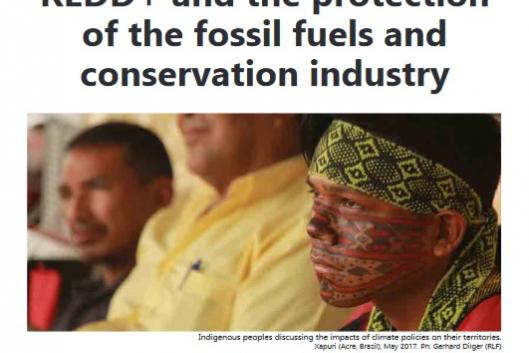(Disponible uniquement en anglais)
This September 2019, the California Air Resources Board (CARB) will make another attempt at pushing through the California Tropical Forest Standard.
Initially, the Air Resources Board had set out to adopt a decision that would allow REDD+ credits to be used by companies in California who are part of the state's emissions trading scheme. When opposition turned out to be harder to overcome than perhaps anticipated, the Air Resources Board introduced another loop to keep the discussion going: Instead of a decision to approve or reject use of international REDD+ credits in the California carbon trading system, it presented a draft 'Tropical Forest Standard' (TFS).
A hearing on the draft TFS in November 2018 saw strong opposition to the California Air Resources Board endorsing the standard. Cited were not only technical flaws but also the question of mandate – why would the California Air Resources Board (CARB) engage in developing and endorsing such a standard if not as a preliminary step for opening the door for REDD+ or forest carbon credits into the California carbon trading scheme. Yet, if this is the objective, the CARB has not been honest about that. What mandate or capacity would the CARB have to enforce or even monitor implementation of the standard in other countries or jurisdictions?
The CARB says that the TFS could also be used by other carbon trading programmes such as the International Civil Aviation Organization's Carbon Offsetting and Reduction Scheme for International Aviation (CORSIA). Aviation is one of the sectors with the fastest emissions growth, and CORSIA is designed to greenwash the climate damage that will result from this irresponsible growth projected by the aviation industry. The CARB must not be complicit in this greenwashing of the international aviation industry.
Following the November 2018 Hearing, minor revisions to the TFS were made and the revised standard presented for public comment. A hearing on this revised TFS version will be held by the CARB on 19 / 20 September 2019.
The World Rainforest Movement has followed the history of attempts to open the California carbon market to international REDD+ and forest carbon credits from the beginning. It has supported opposition to these attempts among others by giving visibility to statements from community and indigenous peoples' organisations in regions that were proposed as suppliers of international REDD+ or forest carbon credits to polluting companies in California and by informing those organisations about the state of discussion at the international stage.
This compilation brings together a selection of statements and articles. The statements make direct reference to initially, the proposal to accept outright REDD+ credits into the California carbon trading scheme and now, the 'detour' via the endorsement by the CARB of a Tropical Forest Standard. Articles address the flaws and irreconcilable contradictions and incoherence of REDD+ and explore why no number of revisions or amendments is likely to turn REDD+ into a credible and effective instrument for forest or climate protection.
In May 2017, forest dwellers, rubber tappers and indigenous peoples united in Xapuri, Brazil, and declared that “We express our indignation about the false solutions, which legitimize the continuity and expansion of a socially and environmentally destructive model. We reject initiatives to offset pollution. We do not accept mechanisms based on restrictions on our way of life, and we express solidarity with people living in the areas that are contaminated by companies seeking compensation (offsets). We stand by the people from other countries who live in the areas impacted by the pollution generated by destructive companies. No one should live in contaminated areas; it is time to end all kinds of racism, including environmental racism.”
We call on the California Air Resources Board to
REJECT ENDORSEMENT
of the California Tropical Forest Standard!
The aviation industry must reduce emissions
NOT offset them!
